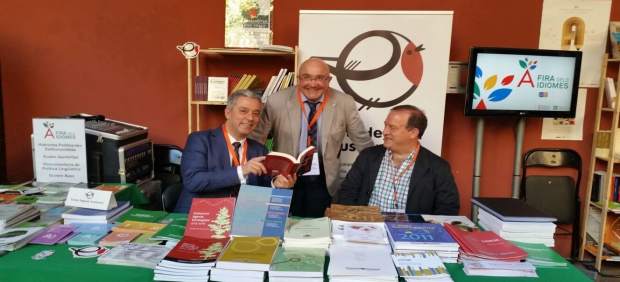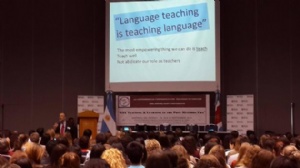Fuente: http://www.20minutos.es/noticia/2747104/0/gobierno-vasco-participa-proyecto-primavera-educativa-que-se-celebra-valencia/


Fuente: http://www.20minutos.es/noticia/2747104/0/gobierno-vasco-participa-proyecto-primavera-educativa-que-se-celebra-valencia/

Alemania/16 de Mayo de 016/itongadol
La universidad de Göttingen desató una tormenta de críticas por parte de los académicos, estudiantes y organizaciones judías cuando no extendió el contrato de trabajo del Dr. Samuel Salzborn, uno de los más destacados expertos académicos en antisemitismo alemán.
«¡Es un escándalo! Esto demuestra que la investigación crítica del radicalismo de derecha / el antisemitismo no se desea en Alemania», expresó Julius Schoeps, un destacado historiador judío alemán y descendiente del filósofo Moses Mendelssohn, que escribió al diario The Jerusalem Post por correo electrónico.
Una carta abierta con el apoyo de decenas de académicos, grupos de estudiantes y organizaciones no gubernamentales de derechos humanos fue enviada a la administración de la universidad a finales de abril titulada «Conservar la silla del profesor Salzborn».
La carta afirma: «El profesor Salzborn es uno de los más distinguidos investigadores del antisemitismo en el área. Salzborn es también un renombrado experto en la extrema derecha y ha publicado muchos estudios sobre el tema».
Salzborn, que ha sido citado en diarios como el New York Times, también tiene experiencia en el antisemitismo contemporáneo (el odio y la deslegitimación del Estado judío).
Fuente: http://itongadol.com/noticias/val/96683/indignacion-en-una-universidad-alemana-por-el-despido-de-un-experto-en-antisemitismo.html

Panamá/ 14 de Mayo de 2016/ La Prensa
Al menos 145 estudiantes de seis provincias y una comarca forman parte de un plan piloto del Ministerio de Educación (Meduca), que les permitirá tener una carrera técnica en dos años.
Así lo informó el jefe de la Dirección Nacional de Educación Media Profesional y Técnica del Meduca, Edwin Medina, quien añadió que están ofreciendo 44 carreras técnicas en 10 centros educativos del país, con la finalidad de insertar a los jóvenes de manera rápida al campo laboral.
La formación técnica que se brinda en centros escolares de las provincias de Chiriquí, Veraguas, Los Santos, Herrera, Panamá, Darién y la comarca Guna Yala tiene su marco legal en el Decreto Ejecutivo No. 149 de 12 de abril de 2016, que aprueba las carreras medias e intermedias en los planteles.
Medina explicó que la oferta educativa, que también le brinda las facilidades al estudiante, para que pueda seguir estudios universitarios, ofrece una formación 70% práctica y 30% de conocimientos científico-humanísticos.
En el artículo 4, el decreto señala que “ los estudiantes que terminen satisfactoriamente el plan de estudio correspondiente a carreras técnicas intermedias, recibirán certificados que acreditará su especialidad y mediante un currículo flexible podrán obtener un diploma de bachiller en cualquier oferta educativa, que le permitirá su ingreso al nivel de educación media”.
CARRERAS INTERMEDIAS
La lista de carreras intermedias incluye áreas conocidas como albañilería, electromecánica, artes gráficas, tapicería, ebanistería, hotelería, turismo, contabilidad, informática, tornería, fontanería, diseño de modas y cocina.
No obstante, tiene otras totalmente desconocidas dentro del área de la educación, porque se realizan con conocimientos adquiridos de manera empírica, como son la instalación de baldosas y cielorraso, diseño de mola, jardinería, riego y drenaje, decoración de bizcochos y manejo de langostas, por mencionar algunos.
El plan piloto será evaluado por el Meduca cada cierto tiempo para conocer la conveniencia de seguir ofreciendo estas modalidades educativas y evitar que el mercado laboral se sature.
PERTINENCIA
El profesor del colegio Artes y Oficios Melchor Lasso de la Vega y miembro de la Asociación de Profesores de la República de Panamá (Asoprof), Juan Muñoz, lamentó que este centro escolar –el primero en formación vocacional en el país– no se tomara en cuenta para formar parte de este plan de formación piloto.
Sin embargo, consideró que las carreras que se van a dictar son pertinentes con las áreas donde se prevé se desarrollará el país en los próximos años, como lo es, por ejemplo, el turismo.
Por su parte, el director de Empleo del Ministerio de Trabajo y Desarrollo Laboral (Mitradel), Hernando Rodríguez, añadió que con estas carreras se busca responder a la necesidad de mano de obra que tendrá el país en los próximos cinco años.
Estimaciones del Mitradel realizadas en 2014 determinaron que en los próximos cinco años en el país habrá una oferta de 265 mil plazas de empleo.
Rodríguez indicó que esta cifra representa un 68% de la oferta de empleos, la cual estará en áreas como turismo, logística, construcción, industria, agricultura y comercio.
De hecho, explicó que estas carreras técnicas intermedias son pertinentes, porque el crecimiento económico que registra el país conlleva el desarrollo de proyectos que necesitarán de mano de obra calificada en otros estándares y tendencias.
En tanto, el arquitecto y expresidente de la Sociedad Panameña de Ingenieros y Arquitectos José Batista explicó que estas carreras, sobre todo en el área de la construcción, mejorarán la oferta laboral.
Añadió que en la actividad de la construcción existen renglones en los que no se aplica un conocimiento formal, sino empírico, como lo es la colocación de cielorrasos y baldosas.
Fuente: http://www.prensa.com/sociedad/anos-formar-tecnicos_0_4482301880.html

www.diariolaprovinciasj.com/16-05-2016/
Del 15 al 17 de septiembre, San Juan será sede del XLI Congreso Anual de la Federación Argentina de Asociaciones de Profesores de Inglés (FAAPI). Organizado por la Asociación San Juan de Profesores de Inglés (ASJPI) el lema en esta edición es «ELT as a Multidisciplinary Endeavour: Growing through Collaboration” (La enseñanza de inglés como propuesta multidisciplinaria: el crecimiento a partir de la colaboración).
Para esta ocasión, se espera la presencia de 700 a mil personas entre los que habrán participantes llegados de diferentes partes no solo de la Argentina sino del mundo. De acuerdo a lo adelantado desde la organización, los disertantes pertenecen a España, Reino Unido, Australia, Estados Unidos, Colombia y Argentina. La FAAPI 2016 incluye como temas centrales la cooperación entre distintas líneas teóricas, los desafíos del aula actual, el uso de las nuevas tecnologías, la interculturalidad y la diversidad, entre otros.
Las sedes donde se desarrollará el Congreso serán el Centro Cultural Amadeo Conte Grand, Centro de Convenciones Barrena Guzmán, Auditorio Eloy Camus, Auditorio del Museo de Bellas Artes Franklin Rawson y el Teatro Sarmiento.
En esta edición 2016 del Congreso Anual de FAAPI se conjugan tres ocasiones especiales:
– Se conmemoran 400 años desde el fallecimiento de William Shakespeare, padre de la literatura angloparlante, y de Miguel de Cervantes, padre de la literatura hispanoparlante.
Se cumplen 25 de años de la primera vez en que el Congreso Anual de FAAPI fuera realizado en San Juan (1991).
Estos tres hitos atravesarán la conferencia, ya que la temática y las actividades sociales previstas se hacen eco de estos momentos especiales en la historia de nuestra profesión.
Nuestra Asociación (ASJPI) ya ha realizado las gestiones para solicitar que el evento sea declarado de Interés Cultural, ante la Secretaría de Cultura del Ministerio de Turismo y Cultura (Expediente N° 1203 0376 P- 15), y ha iniciado los trámites para solicitar el aval del Ministerio de Educación de la Nación y de la Provincia. Asimismo, ya hemos obtenido el aval de la Universidad Nacional de San Juan (UNSJ), de la Facultad de Filosofía, Humanidades y Arte de la UNSJ, y de la Universidad Católica de Cuyo. Asimismo, ya se ha obtenido el aval de la Legislatura de la Provincia de San Juan.
En la realización del evento, se utilizarán distintas sedes de nuestra ciudad, cuyo uso ha sido solicitado a las autoridades correspondientes (Centro de Convenciones Barrena Guzmán; Centro Cultural Conte Grand; Teatro Sarmiento; Museo de Bellas Artes Franklin Rawson; Auditorio Eloy Camus del Centro Cívico; Facultad de Ingeniería de la UNSJ.
La Comisión Organizadora y Directiva de ASJPI está orgullosa de actuar como anfitriona de este encuentro. Desde ya contamos con la solidaridad de toda la población de San Juan para asegurar que este evento académico se transforme en una experiencia que los visitantes quieran repetir y que permita proyectar a San Juan tanto a nivel nacional como internacional.

www.diariocorreo.pe/15 de Mayo del 2016 – 14:15 » Textos: Allison Cadenillas acadenillas@grupoepensa.pe » Fotos: Horacio Díaz
Centros de alternancia se expanden en el país. Más de 4300 estudiantes de zonas rurales se benefician con nuevo modelo educativo, en quince regiones del Perú.
Frilán Curasi tiene 17 años, está en quinto de secundaria y es uno de los 4380 alumnos que a lo largo del territorio nacional estudian en los 68 Centros Rurales de Formación en Alternancia (CRFA). Ahí se aplica un modelo educativo distinto al de otros colegios nacionales.
El joven asiste el colegio Waynakunap Riqcharinan Wasi, en el valle de Quispicanchi, distrito de Urcos, provincia de Muñapata, en Cusco. Esa escuela fue uno de los primeros centros de formación en alternancia que se fundó en Perú en el año 2002. Su nombre traducido al español lo dice, es “La casa del despertar de los jóvenes”.
Nuevo modelo. La experiencia comenzó por la iniciativa de la ONG ProRural. David Bauman, director de esa organización, explica que es un modelo en el que los alumnos acuden al centro educativo dos semanas completas como en un internado.
Luego, en las siguientes dos semanas, vuelven a sus hogares para ayudar en las tareas del hogar y de paso desarrollar sus proyectos de investigación y producción.
“Cada uno de los CRFA tiene su propio plan de formación, adecuado a la realidad de la comunidad”, afirma Bauman.
Es decir, se cumple con la currícula que exige el Estado, pero se organizan los contenidos de manera distinta.
Esos centros de formación están dirigidos a estudiantes que viven a largas distancias de donde se hallan los colegios y les facilita el aprendizaje.
Jehnny Chompy Huanca, directora de Waynakunap Riqcharinan Wasi, informa que los 150 alumnos que acuden al centro viven en comunidades que distan entre treinta minutos y tres horas de caminata de las aulas.
Desarrollo. Uno de los pilares de este modelo es la gran responsabilidad que recae en los padres y autoridades comunales, quienes con su iniciativa ayudan a elaborar el currículum en base a las necesidades de su comunidad.
En ocasiones, los recursos, como comida y equipamiento de dormitorios, también corren a cuenta de ellos, como sucede en el colegio de Frilán, donde hasta el año pasado los estudiantes asistían al local comunal para estudiar y pasar dos semanas de estudio intensivo. Hoy cuentan con una infraestructura moderna, pero aún faltan equipos.
Como explica Fernando Guillén, coordinador de servicios educativos de secundaria rural del Ministerio de Educación, se requiere hacer modificaciones a los lineamientos de equipamiento que tiene el ministerio, ya que servicios como cocina o dormitorios aún no están contemplados por esta entidad.
Emprendimiento. Otro valor que aportan estos colegios es la formación en negocios adecuados a las realidades rurales. Frilán, por ejemplo, desarrolla un proyecto productivo sobre el cultivo de la linaza, actividad que realizan sus padres. Él, como sus 24 compañeros, sustentará su proyecto productivo frente a un auditorio para egresar del colegio.
Según Bauman, existe gran cantidad de egresados que sustentan sus estudios superiores con el dinero que les brindan estos proyectos al ponerse en marcha.
*Información de la imagen: DEDICADOS Alumnos estudian materias acordes con su realidad

www.elespectador.com/16-05-2016/EFE/Foto Reuters
Alertó que 120 mil menores necesitan de forma urgente espacios temporales de aprendizaje.
Un mes después del seísmo que asoló el norte costero de Ecuador, 120 mil niños necesitan de forma urgente espacios temporales de aprendizaje, dado que miles de personas viven aún en refugios informales sin servicios básicos, alertó hoy Unicef.
El terremoto del 16 de abril causó 660 muertos, destrozó los sistemas de agua y dañó 33 centros de salud, la mitad de los cuales ya no están operativos, así como 560 escuelas y cerca de 10 mil edificios, recordó el Fondo de Naciones Unidas para la Infancia (Unicef) en un comunicado.
Añade que la respuesta inmediata del Gobierno ha permitido que el 75% de los niños hayan podido regresar a la escuela y que más de 30 personas estén acogidas en refugios oficiales y reciban asistencia básica y apoyo psicológico y médico.
Unicef señala que con el apoyo de esa agencia de la ONU se restauró el acceso al agua en Jama y Pedernales, dos de las ciudades más afectadas por el terremoto de 7.8 grados en la escala abierta de Richter, que castigó especialmente la provincia costera de Manabí y el sur de su vecina de Esmeraldas.
“En una región donde 1 de cada 5 niños sufre diarrea y desnutrición crónica es esencial dar a estos niños los medios básicos para sobrevivir y prosperar”, explicó Grant Leaity, representante de Unicef en Ecuador, en el comunicado.
La agencia señala que los fondos recibidos para atender la urgencia en Ecuador “siguen siendo extremadamente bajos”.
Unicef destaca que necesita 15 millones de dólares para cubrir las necesidades de 250 mil niños hasta mediados de julio, pero hasta ahora solo ha recibido el 15 % de esta cantidad.
“Si la comunidad de donantes no aumenta su apoyo, estaremos fallando a miles de niños”, advirtió Leaity.
Cuando se cumple un mes del seísmo, Ecuador tiene previsto para este lunes ceremonias religiosas, algunas de ellas al aire libre porque las iglesias colapsaron con la sacudida, en poblaciones como Pedernales, Manta, San Vicente, Jama y Portoviejo, en la provincia de Manabí, la más golpeada por el temblor.
El devastador temblor dejó a más de 7 mil 600 familias ubicadas en albergues temporales y en verdaderas ciudadelas de tiendas de campaña donadas por países amigos y organismos internacionales, situadas en zonas seguras.
La asistencia en servicios básicos, alimentación, salud y educación no se ha detenido en la región, que tras un mes de zozobra ha empezado a levantarse, como advierten muchos mensajes emitidos por medios de comunicación y en redes sociales.

www.elpais.com/16-05-2016/Por: Angel L. Martinez Cantera
Gracias a la alfabetización, los indígenas pueden enfrentarse a las compañías que explotan los recursos naturales.
Varios niños greñudos y en paños menores garabatean sumas encaramados a la copa de un árbol. Otros repasan la tabla de multiplicar en el suelo frondoso mientras los adolescentes vuelven con el botín con el que acompañar el arroz de la cena: un par de ratas salvajes y babosas de río. Oscurece y los alumnos continúan sus clases a la luz de velas y frontales mientras los adultos se acuestan a la intemperie, bajo la bóveda de estrellas que envuelve la jungla. En la noche, sólo se escuchan los sonidos inquietantes de la selva y los susurros de los estudiantes de la comunidad indígena de Sumatra: los Orang Rimba, gente del bosque en lengua bahasa.
“La educación permite conocer los efectos positivos y negativos de la modernidad. El objetivo es ellos que escojan con conocimiento de causa”, explica la profesora de 27 años, Tri Astuti, señalando a los niños mientras recoge lápices y papeles desperdigados por el exuberante verde de la jungla; el aula sin pupitres ni pizarras donde imparte clases. Astuti y otros tres educadores del proyecto Sokola Rimba hacen incursiones semanales en las profundidades de la selva para enseñar a los miembros de la comunidad indígena con un método adaptado a sus costumbres. El currículum especial de La escuela de los Rimba fue diseñado por la antropóloga Butet Manurung hace 15 años y ha permitido educar a más de 300 miembros de los 1.500 Orang Rimba sin dejar de lado sus quehaceres diarios en el entorno de la jungla de Jambi, en la isla de Sumatra.
La alfabetización es un puente que salva desigualdad indonesia en materia de educación, que expone a las tribus aborígenes ante la explotación de los recursos de su hábitat natural. “La situación de los Orang Rimba es de las peores, debido a su forma de vida y a que el gobierno ha vendido sus tierras a compañías privadas”, explica Rukka Sombolinggi, secretaria general de la Alianza de las Pueblos Indígenas de Indonesia (AMAN), organización nacional para la defensa de los derechos de las 800 tribus indígenas del país; que suman alrededor de 17 millones de habitantes. Rukka subraya que el resto de comunidades aborígenes también sufren las consecuencias del analfabetismo y la escasez: “La mayor parte de los pueblos indígenas de Indonesia no tienen acceso a servicios públicos. Especialmente aquellos que viven en regiones remotas; a los que no sólo les falta sanidad y educación, sino también infraestructuras”.
Los Orang Rimba huían al ver mis bolígrafos. Los asociaban a los instrumentos usados para firmar contratos con los que las compañías les quitaban sus tierras
La educación en Indonesia es tan vasta como desigual. El archipiélago del sudeste asiático tiene el cuarto sistema de enseñanza más grande del mundo (tras China, India y EEUU). Una red de servicios de más de 250.000 escuelas y casi tres millones de profesores saturada con 50 millones de estudiantes. El gobierno ha hecho esfuerzos para mejorar tan inmenso entramado. Según los datos del Banco Mundial, Indonesia dobló su gasto en educación entre 2000 y 2007; llegando a invertir el 16% del presupuesto nacional (más que en ningún otro sector). Pero las cifras son engañosas, y la enseñanza no llega a las comunidades más desfavorecidas. El informe de la Unesco sobre Educación en la región de 2014 señala que el 60% de las mujeres indígenas del país son analfabetas, mientras que las adineradas de Bali tienen acceso casi universal a la educación.
El analfabetismo de las comunidades tribales las condena a la marginación y las hace presas fáciles de los intereses privados en sociedades inmersas en implacables procesos de desarrollo. Hace poco más de un lustro, los Orang Rimba vivían plácidamente en la jungla sin necesidad de entrar contacto con los lugareños de Jambi. No sólo les bastaba con el agua de los ríos y los animales de las más de 60.000 hectáreas del Parque Nacional de Bukit Dua Belas, sino que sus tradiciones ambientalistas habían sido las mejores guardianes del bosque. Hasta que la explotación de los recursos de la selva virgen atrajo a compañías privadas.
Para los jóvenes Orang Rimba, el acceso a la enseñanza fue la única forma de comprender la realidad que los invadía. “La educación nos ayuda a entender el mundo. Mucha gente de nuestra tribu no quiere aceptar el desarrollo, y les entiendo. Pero tenemos que estar preparados para los efectos de la modernización”, explica Pengendum Tampung, de 27 años y quien fue unos de los primeros de su tribu en leer y escribir gracias a Sokola Rimba. Sin embargo, Pengendum también recuerda que la idea de asistir a una de las clases de Butet Manurung, la intrusa empeñada en ayudarles a aprender, le daba tanto miedo como el ruido de los los aviones sobrevolando la selva.
No fue fácil salvar los prejuicios de la comunidad indígena. En su libro, Butet Manurung detalla cómo pasó un año dentro de la jungla de Sumatra, infestada de sanguijuelas o atacada por serpientes y osos, hasta que consiguió tener acceso a la tribu. “Los Orang Rimba huían al ver mis bolígrafos, a los que llamaban demonios con ojos puntiagudos. Los asociaban a los instrumentos usados para firmar contratos con los que las compañías les quitaban sus tierras”, dice Butet entre risas: “En cierta forma estaban en lo cierto. Saben que un lápiz puede cambiar vidas”.
Después de cuatro años de convivencia, Butet convenció a algunos líderes tribales. “Nos dimos cuenta de la importancia de la educación porque los mercaderes nos timaban. No sabíamos ni convertir las escalas a precios, y vendíamos tres y cuatro kilos de chile como si fuese uno…”, recuerda Celitai, líder de un rombong (clan Orang Rimba). Como el resto de jefes de los 11 grupos tribales, Celitai se oponía fervientemente a que la educación modificase sus tradiciones. Hasta que en mitad de un acuerdo de compraventa, uno de sus hijos leyó en voz alta el contrato de arrendamiento con el que una compañía quería arrebatarle sus tierras. El poder de la alfabetización se hizo tan patente entonces como la fuerza de la naturaleza a la que veneran.
El primer programa de estudios de La Escuela de los Rimba sólo tenía 12 alumnos. Los intrépidos estudiantes, a hurtadillas para evitar represalias familiares, veían cómo la profesora Butet Manurung pintaba sobre madera y lodo para memorizar nombres y números. En la actualidad, casi todos los niños de la comunidad Orang Rimba asisten a clase. No sólo eso. El proyecto también se ha extendido a otras cinco áreas tribales de Indonesia dando cobertura educativa a más de 10.000 indígenas de Makassar, Aceh, Flores, Moluccas y Papua. Recientemente, Sokola Rimba también ha salvado otro tabú indígena incluyendo a la mujer en la enseñanza con un pequeño grupo de 25 niñas.
“Nosotros no somos ni idiotas ni pobres. Otros pueden parecer necios en medio de la selva sin tener nuestro conocimiento sobre la naturaleza”
Educar en la jungla surte efecto, a pesar de los prejuicios y de la dificultad que supone enseñar en un entorno salvaje, con tantos elementos de distracción para los alumnos. Algunos de los Orang Rimba que empezaron su alfabetización hace una década cursan ya estudios superiores. Butet Manurung asegura que el nivel de precisión en lectura y escritura de algunos alumnos Orang Rimba es superior al de estudiantes de escuelas gubernamentales. “Nosotros educamos para solucionar problemas diarios en profundidad. Mientras que las escuelas tradicionales enseñan un poco de todo y sus estudiantes encuentran difícil resolver problemas relacionados con dinero, por lo que tienen que anotar las cifras. Nuestro método es más práctico”.
El éxito del modelo educativo es que está orientado a satisfacer las necesidades de la comunidad. “Sokola [Rimba] no pretende educar como una escuela convencional. Aquí hay tiempo disponible para la caza o la recolecta y enseñamos lo que puede ser útil para la tribu, como las leyes que les amparan o el álgebra para el comercio”, explica Aditya Dipta Anindita, coordinadora de Sokola Rimba. “Entendieron que necesitaban saber acerca de leyes para parar el latrocinio de tierras. Para luchar contra gente letrada, necesitas alfabetización”.
El parque natural de Jambi, hábitat de los Orang Rimba, se ha reducido en un 30% por la venta de terreno selvático para su explotación comercial. “Los Parques Nacionales son como una concesión. Se designan sin previo aviso y sin el consenso de los pueblos indígenas. Muchos de ellos han sido expulsados de sus tierras”, explica Rukki Sombolinggi. Su organización, AMAN, consiguió que la ley vinculase el uso forestal a las comunidades que lo habitan y no a los intereses del estado.
El gobierno intenta paliar los efectos de la explotación de la selva y de su mala políticaofreciendo casas a los Orang Rimba. Pero las organizaciones conservacionistas como AMAN, defienden a ultranza la preservación de las tradiciones de los pueblos indígenas y se niegan a estas medidas. “La mayoría de Orang Rimba no quieren unacasa estándar. Ellos quieren un hogar, y el suyo es el bosque. El gobierno debe recuperar esa tierra para que las tribus sobrevivan”, sentencia Rukki.
Butet Manurung no es tan tajante: “Las organizaciones [conservacionistas] están preocupadas porque las tradiciones se puedan perder. Pero la identidad es una cuestión compleja. Hoy en día, mis estudiantes son muy diferentes unos de otros; a unos les gusta la jungla y otros quieren viajar. Nuestro objetivo es que se hagan responsables de de sus elecciones y que consigan sus aspiraciones; cualesquiera que esas sean”. La antropóloga prefiere que cada individuo tome sus propias decisiones, a sabiendas de sus consecuencias. Por ejemplo, algunos de sus estudiantes Orang Rimba ahora viven fuera del parque nacional mientras otros han creado una organización juvenil para cartografiar el terreno y evitar la expansión de cultivos dentro de la jungla.
Este grupo encargado de custodiar los bosques se está convirtiendo además en portavoz de las demandas de su tribu. Los estudiantes patrullan la jungla en moto; lápices, libretas y smartphones en mano. De tanto en cuanto, descansan en mitad de la tupida selva para almorzar y demuestran al ignorante forastero por qué ellos son más sabios y los mejores guardianes de la naturaleza. Bien escalan los sagrados y colosales árboles sialang para recolectar su jugosa miel. Bien recogen cortezas de árbol (venenosas para peces y no para humanos) que esparcen en el río para hacerse con suculentas raciones de pescado. “Nosotros no somos ni idiotas ni pobres. Otros pueden parecer necios en medio de la selva sin tener nuestro conocimiento sobre la naturaleza”, dice Pengendum, uno de los creadores de la organización. El estudiante Orang Rimba repite una lección bien aprendida: “Además, ahora sabemos que los lápices también pueden cambiar vidas y protegernos”.
*Información de la imagen: Los Orang Rimba no tienen acceso a educación ni servicios sanitarios públicos, como les ocurre a la mayor parte de las tribus indígenas de Indonesia. Á. L. M. C.